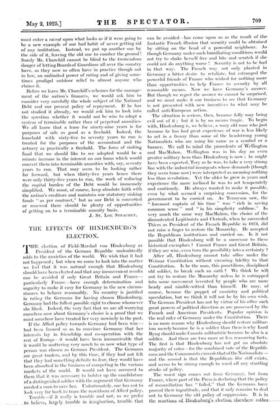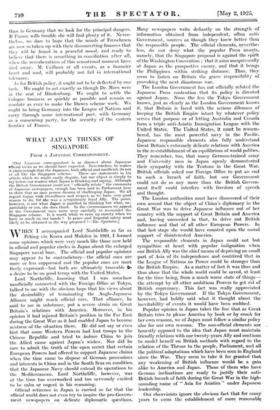THE EFFECTS OF HINDENBURG'S ELECTION.
THE election of Field-Marshal von Hindenburg as President of the German Republic undoubtedly adds to the anxieties of the world. We wish that it had not happened ; but when we come to look into the matter we feel that it was natural enough that Hindenburg should have been elected and that any inconvenient results can be avoided if only Great Britain and France— particularly France—have enough determination and sagacity to make it easy for Germany in the new circum- stances to behave reasonably. No country is justified in rating the Germans for having chosen Hindenburg. Germany had the fullest possible right to choose whomever she liked. Indeed, the very fact that we are all worrying ourselves now about Germany's choice is a proof that we Must somehow have treated her very unwisely in the past.
If the Allied policy towards Germany had been wise— had been framed so as to convince Germany that her interests lay in friendship and co-operation with the rest of Europe—it would have been inconceivable that it would be mattering very much to us now what type of person was chosen as German President. The Germans are great traders, and by this time, if they had not felt that they had something definite to fear, they would have been absorbed in the business of competing in the various markets of the world. It would not have occurred to them that it was necessary to bolster up the candidature of a distinguished soldier with the argument that Germany needed a man to save her. Unfortunately, one has not to look very far back to trace the unwidsom of Allied policy.
Trouble—if it really is trouble and not, as we prefer Believe,_largely trouble in imagination, trouble that can be avoided—has conic upon us as the result of the fantastic French illusion that security could be obtained by sitting on the head of a powerful neighbour. As though Germany under such humiliating conditions would not try to shake herself free and bite and scratch if she could not do anything worse ! Security is not to be had in that way. The French way not only planted in Germany a bitter desire to retaliate, but estranged the powerful friends of France who wished for nothing more than opportunities to help France to security by all reasonable means. Now we have Germany's answer. But though we regret the answer we cannot be surprised, and we must make it our business to see that Germany is not presented with new incentives to what may be called anti-European action.
The situation is serious, then, because folly may bring evil out of it ; but it is by no means tragic. To begin with, Hindenburg is, we believe, a wary old man who just because he has had great experience of war is less likely to act in a frenzy than some of the headstrong young Nationalists who are using his name as a symbol or a banner. We call to mind the precedents of Wellington and MacMahon. Wellington was in his day an even greater military hero than Hindenburg is now ; he might have been expected, Tory as he was, to take a very strong line with the industrial insurgents whose demands (though they seem tame now) were interpreted as meaning nothing less than revolution. Yet the older he grew in years and experience the more inclined he was to act temperately and cautiously. lie always wanted to make it possible, even by what seemed a surprising concession, for the government to be carried on. As Tennyson saw, the " foremost captain of his time " was " rich in saving common sense " and " in his simplicity sublime." In very much the same way MacMahon, the choice of the discontented Legitimists and Clericals, when he succeeded Thiers as President of the French Republic in 1873, did not raise a finger to restore the Monarchy. He accepted the Republican institutions and carried on. Is it not possible that Hindenburg will be a successor to these historical exemplars ? Cannot France and Great Britain, if they are wise, even turn the possibility into a certainty ?
After all, Hindenburg cannot take office under the Weimar Constitution without swearing fidelity to that Constitution. Is he the man, this punctilious, disciplined old soldier, to break such an oath ? We think he will not try to restore the Monarchy unless he is entrapped into some movement invented by people who are more heady and nimble-witted than himself. He may, of course, become the puppet of casuistry and political speculation, but we think it will not be by his own wish. The German President has not by virtue of his office such great powers of political direction as are possessed by the French and American Presidents. Popular opinion is the real ruler of Germany under the Constitution. There is no more reason why Hindenburg should restore militar- ism merely because he is a soldier than there is why Lord Byng should make Canada militaristic because he also is a soldier. And there are two more or less reassuring facts.
The first is that Hindenburg has not got an absolute majority of votes—for the combined vote of the Republi- cans and the Communists exceeds that of thc Nationalists— and the second is that the Republican bloc still exists, and seems to be strong enough to ward off any startling stroke of policy.
The worst sign comes not from Germany, but from France, where part of the Press is declaring that the policy of reconciliation has " failed," that the Germans have proved their ingratitude, and that it only remains to deal out to Germany the old policy of suppression. It is in the . reactic444,4 tlinf4burg'.* relectiuD„ 4elithere rather- than in Germany that we look for the principal dangers. If France wills trouble she will find plenty of it. Never- theless, we dare to hope that the minds of Frenchmen are now so taken up with their disconcerting finances that they will be found in a peaceful mood, and ready to believe that there is something in conciliation after all, when the reverberations of this sensational moment have died away. M. Caillaux at all events, as a financier heart and soul, will probably not fail in international tolerance.
As for British policy, it ought not to be deflected by one inch. We ought to act exactly as though Dr. Marx were in the seat of Hindenburg. We ought to settle the Cologne business as quickly as possible and remain as resolute as ever to make the Dawes scheme work. We ought to bring Germany into the League of Nations and carry through some international pact, with Germany as a consenting party, for the security of the eastern frontier of France.











































 Previous page
Previous page